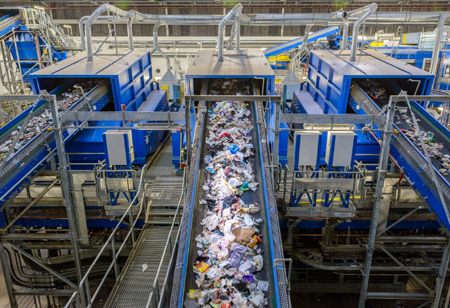
The usage of waste to generate electricity has skyrocketed in the recent times. Transforming of garbage into energy may be utilised to generate heat or power. We can now decrease landfill garbage and our reliance on conventional energy sources by employing this technique comes to an end. Waste to energy technology can reduce greenhouse gas emissions while opening up employment opportunities in the green energy industry. Two additional benefits of this technology are better waste management techniques and a decrease in the amount of waste dumped in landfills. According to HWH Environmental The global waste management market is projected to be valued at 1.96 trillion U.S. dollars by 2030. It is estimated that over 2 billion tons of MSW are generated each year, and that this number will increase to 3.4 billion tons by 2050.Waste Management Equipment converts waste into energy can help minimize the need for fossil fuels and build a more sustainable energy infrastructure. Furthermore, it can lessen the air pollution caused by burning fossil fuels. Waste to energy equipments can save energy costs by generating a new sustainable energy source that converts waste into energy which can also foster job growth and economic expansion. Additionally, it can assist in avoiding landfills, which can contribute in optimizing the negative environmental effects of garbage disposal. This in turn, promotes a sustainable and effective method of producing renewable energy is waste to energy.
Some of the noted reasons why waste wanagement equipments are gaining popularity might be stated as -
Waste management equipments are mainly used to sort, process, and recycle various kinds of wastes. It can also be transformed into useful resources, such as heat and electricity. Also, it may contribute to a decrease in the extent of airborne pollutants that are fatal to organic matter. The use of waste management systems can drastically lessen the harmful effects of trash on the environment. It may also aid in lowering trash disposal costs. Although this kind of machinery is normally employed in commercial and industrial spaces, it can also be used in domestic settings to cut down on household waste. By recycling materials and reducing emissions, it can consequently reduce atmospheric pollution. This could in turn decrease the requirement for landfill space and the amount of energy required to dispose of said waste. The use of waste management equipment can significantly lessen the negative effects of trash on the environment. For instance, waste materials can be collected, sorted, and processed using waste management equipment to minimize the quantity of garbage transported to landfills by up to 90%.
Waste management tools can be used to optimize the quantity of waste that must be disposed of in landfills, hence reducing the pollution those facilities produce. It may also aid in lowering the energy required to treat garbage, resulting in a more effective and environmentally friendly waste management system. This can be beneficial to the environment by lowering greenhouse gas emissions. Businesses and communities can become more sustainable and contribute to lowering air and water pollution by investing in these methodologies. Additionally, spending money on these equipments might stimulate the local economy by generating jobs in the area. Ultimately, because the equipment is made to be more economical and efficient, it can assist reduce energy expenditures as a result of lower energy bills. For instance, purchasing waste sorting robots can help businesses operate more cheaply by reducing the need for manual labour.
Businesses will reap monetary savings, as a result, increasing their marketability. Additionally, it may contribute to the growth of the waste management sector's employment market. Businesses can focus on effective trash disposal strategies, such composting or recycling, by lowering the amount of waste that needs to be processed. This can have a positive impact on the environment and lower expenses for businesses. Likewise, the growing need for services in the waste management sector may result in additional employment being created, which would promote economic growth. A more sustainable future for enterprises and society at large may result from this. For instance, since the introduction of the Waste and Resources Action Programme in 2000, the UK has experienced a growth in the number of jobs in the waste management business, with the number of individuals employed in the sector rising by approximately 40%.
All in all, this trend is likely to continue as countries around the world focus on reducing their environmental impact as far as waste management is concerned. Due to this, a lot of businesses are investing in waste management technologies to increase productivity and lower their environmental impact. The use of waste management tools may minimize the volume of garbage disposed of in landfills and incinerators, as well as the quantity of pollutants produced by burning waste. This may result in improved community health, better air, and a more sustainable future. garbage management technologies not only help businesses save money by lowering the cost of garbage disposal, but they also generate jobs in the sector.
We use cookies to ensure you get the best experience on our website. Read more...